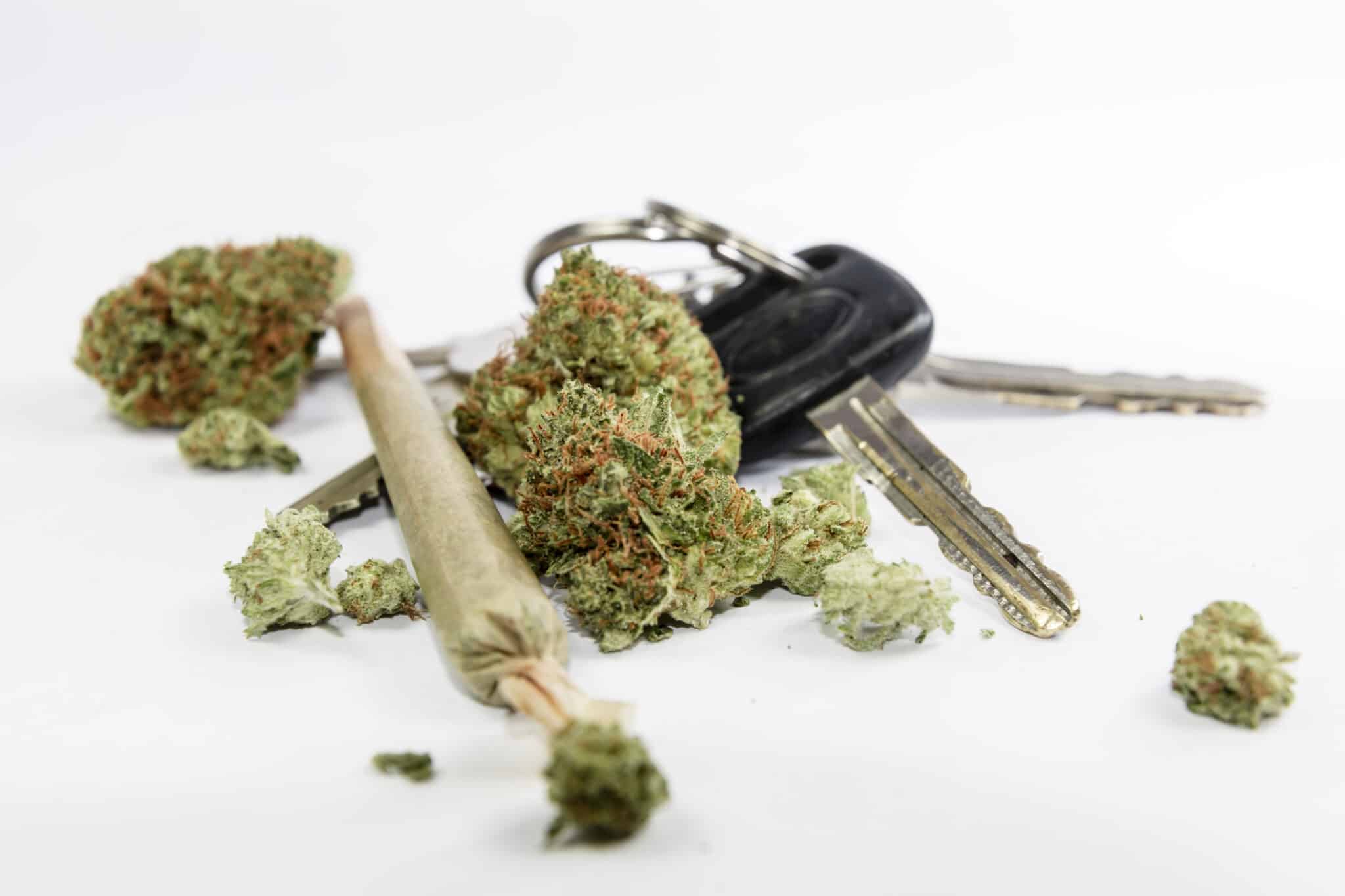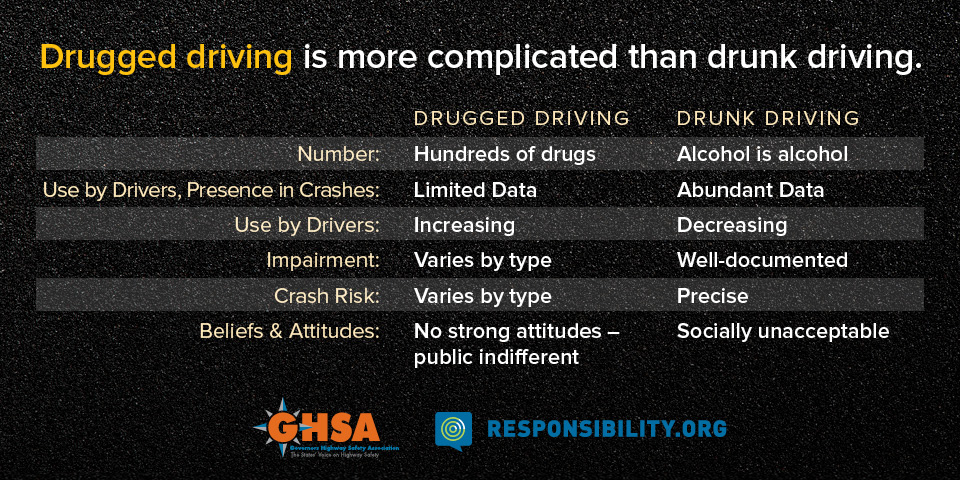
Michigan Crashes Caused by Drugged Drivers Surge Towards National Trends
Drugged driving deaths have risen 263 percent in the past decade. Last year, the Detroit Free Press reported via Michigan State Police statistics, “drugged drivers caused 127 crashes that killed 141 people in the state … That’s still less than the 165 crashes caused by drunken drivers that killed 176 people, but the trends are heading in opposite directions.” In fact, in 2017 the National Highway Traffic Safety Administration’s (NHTSA) Fatality Analysis Reporting System (FARS) reported, on a national average drugs are present in 43 percent of the fatally-injured drivers with a known test result, more frequently than alcohol was present.
Reviewing these alarming statistics provides an opportunity to inform and encourage others to learn more about the increased dangers of drugged driving.
- Use of illicit drugs or misuse of prescription drugs can make driving a car unsafe—just like driving after drinking alcohol.
- It’s not just one drug that is the issue. Hundreds of different drugs can impair drivers.
- In 2014, 10 million people aged 12 or older reported driving under the influence of illicit drugs in the past year.
- After alcohol, prescription drugs, marijuana and cocaine are the drugs most often linked to drugged driving.
- Men are more likely than women to drive under the influence of drugs or alcohol.
- A higher percentage of young adults ages 18 to 25 drive after taking drugs or drinking than do those 26 or older.
- For many drugs the relations between a drug’s presence in the body,
its effect on driving, and its effects on crash risk are complex, not understood well and vary from driver to driver.
The Governors Highway Safety Association’s Drug-impaired Driving Report was revised in 2017 and states more than 400 drugs that the NHTSA tracks were found in positive drug tests reported from drivers involved in collisions or unsafe driving. Nearly half of these drugs were prescriptions-based opioids and amphetamines while marijuana accounted for roughly 35 percent of positive drug tests reported. Altogether, these four broad categories of drugs impaired those drivers:
- Illegal drugs: the main families are narcotics, stimulants, depressants (sedatives), and hallucinogens.
- Legal non-medicinal drugs
- Prescription medications
- Over-the-counter medicines
In Michigan, in addition to marijuana, a driver who is taking a legally prescribed drug can be prosecuted for drugged driving if police can show it impaired that person’s driving ability.
Alcohol Crashes vs. Drug-Related Wrecks
A review of state crash data from 2011 through 2015 by the University of Michigan’s Transportation Research Institute found that drug users and drinkers impair differently and at different hours.
- Alcohol-involved crashes are very concentrated late at night and on weekends when bars close, but drug-involved crashes seem to occur at all times of day.
- Alcohol-related crashes peak on weekends. Drug-related crashes also are common then, but they tend to be more evenly spread throughout the week.
Those who choose to drive drunk often have poor decision-making skills and slower reaction time and are more likely to drive drugged as well.
Drugs and Teen Drivers Create Deadly Risks
Car crashes are the leading cause of death among young people aged 16 to 19 years. Marijuana use is continuing to increase among drivers of all ages, but teen drivers are a group most influenced by the drug. Mix their drug use habits with less experience on the road and inability to recognize dangerous situations, speed and risky driving decisions, this group is likely to be at fault for a drug-related, tragic accident.
A 2011 survey of middle and high school students showed 12 percent of high school seniors had driven after using marijuana, compared to around 9 percent who had driven after drinking alcohol. In addition, 1 in 6 college students with access to a car has driven under the influence of a drug other than alcohol at least once in the past year. Marijuana is the most common drug used by teen drivers, followed by cocaine and prescription pain relievers.
Battle to Prove Impaired Driving
More work needs to be done to evaluate how drivers can be tested and crashes caused by drugged driving can be prevented. These steps are struggling mostly because:
- Many officers are not trained to identify the signs and symptoms of drivers impaired by drugs other than alcohol.
- A good roadside test for drug levels in the body doesn’t yet exist.
- Police don’t usually test for drugs if drivers have reached an illegal blood alcohol level because there’s already enough evidence for a DUI charge.
- Many drivers who cause crashes are found to have both drugs and alcohol or more than one drug in their system, making it hard to know which substance had the greater effect.
- Proving impaired driving by someone who is taking valid prescription drugs can be difficult.
The bottom line is that impaired driving as the result of alcohol OR drug use is going to put other drivers, passengers, pedestrians and others at a higher risk for crashes or being involved in a fatal accident. Everyone can take steps to reduce the amount of drunk or drugged drivers on Michigan roads. The Lee Steinberg Law Firm offer these impaired driving tips to keep everyone safe.
- Refrain from using drugs and alcohol.
- Offer to be a designated driver.
- Use ride-share services.
- Appoint a designated driver to take all car keys.
- If you feel impaired, ask for help leaving gatherings where drugs and alcohol are present.
- Discuss the risks of drunk and drugged driving with family, teens, and friends.
- Lead by example.
Michigan is a zero-tolerance state, meaning drivers can be prosecuted for any amount of cocaine or Schedule 1 drug, such as marijuana, in their system except for those individuals who hold a medical marijuana card.
Drugged Drivers Should Be Held Accountable
The attorneys and staff at the Lee Steinberg Law Firm care greatly about our clients and members of the communities we serve. We hope if you are involved in an accident involving a drugged or impaired driver that you will call us for help. Our motor vehicle accident lawyers will be ready to support you in your time of need and healing, and we can help decrease the financial pressures on your family by aggressively pursuing a claim on your behalf.
Call us today to get started with your FREE consultation: 1-800-LEE-FREE.

